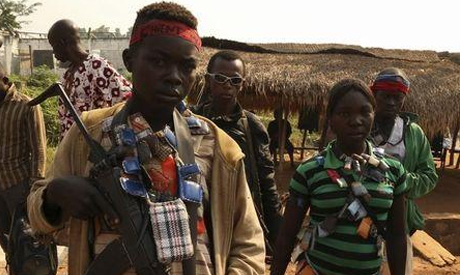
File Photo: An Anti-balaka child soldier wears lucky charms around his neck while he poses for a picture in Ouengo district, 7th arrondissement in Bangui (Photo: Reuters)
Leaders of armed groups in strife-ravaged Central African Republic agreed Tuesday to release thousands of child soldiers and to end underage recruitment, UNICEF said.
The United Nations children's agency described the news as a "major step forward" in the country, where it estimates 6,000 to 10,000 children to be held by various armed factions.
"The Central African Republic is one of the worst places in the world to be a child, and UNICEF is eager to work with local authorities to help reunite these children with their families," UNICEF representative Mohamed Malick Fall said in a statement.
The children involved includes those serving as combatants, those used for sexual purposes and those working in roles such as cooks and messengers.
The agreement to release them was signed this week during a reconciliation forum in the capital Bangui, backed by UNICEF and its partners with the aim of restoring peace to the country, which plunged into violence after a 2013 coup.
More than two years of conflict in the deeply poor and landlocked nation has led to "one of the world's worst -- and least visible -- humanitarian crises," according to the UNICEF statement.
The latest strife in a nation long riven by coups, army mutinies and insurgency took on an unprecedented religious dimension after the last coup, pitting mainly Muslim rebels against Christian vigilantes at the expense of the civilian population.
The parties that signed the accord will now agree on a schedule to release the children, although this will place fresh demands on the already limited funding available, UNICEF said.
Last week the UN warned that it had received only a fraction of the funds needed to address the crisis, calling for it not to be forgotten by the world.
The transitional government is almost entirely dependent on foreign funds as it faces the difficult task of rebuilding a ruined administration, and the economy is in tatters.
About half the population of 4.6 million people lives in severe poverty and needs humanitarian aid, while 1.5 million people are considered food insecure, according to the UN.
Many regions are affected by lawlessness, with around 50,000 people forced to flee to neighbouring countries and another 20,000 displaced inside the country since last December.
Since December 2013, nearly 900,000 people have been displaced.
Last year, UNICEF helped to secure the release of more than 2,800 children from armed groups in the Central African Republic, while 500 were released in 2013.
Short link: